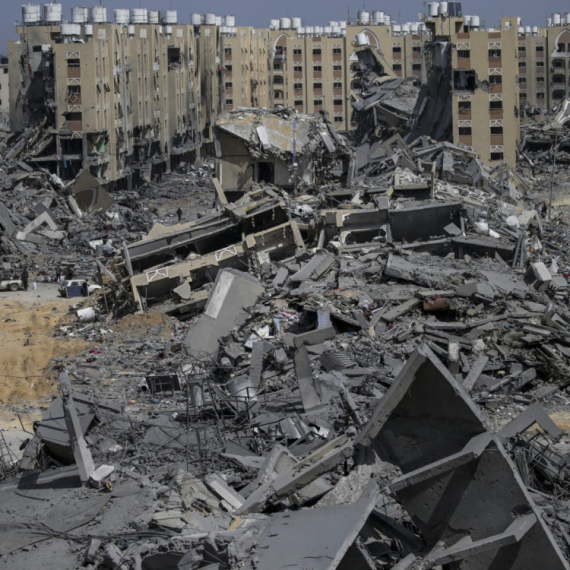73 years since Nazi bombing of Belgrade
A ceremony was held on Sunday in Belgrade at the site of the former National Library of Serbia, destroyed as WW2 started in Serbia.
Monday, 07.04.2014.
09:42

73 years since Nazi bombing of Belgrade
Acting Director of the National Library of Serbia Svetlana Jančić noted that, apart from a large number of victims and massive destruction of the city, the 1941 Nazi bombing of Belgrade took away the precious national scientific and cultural heritage that was kept in the National Library since its foundation in 1832.The bombs destroyed over 1,300 medieval manuscripts and documents on parchment and paper, over 300,000 books from the first Serbian printing companies from 15th-18th century, newspapers and magazines from 18th, 19th and 20th century, around 2,000 letters by writers and distinguished figures of the Serbian and other South Slavic peoples, rich collections of maps and music works, complete documentation, all inventories and catalogues.
Despite the total demolition, the new National Library, rebuilt thanks to the state, but also love and dedication of numerous individuals and donors, has grown into a modern library of the 21st century, she said.
"The destruction of the National Library is one of the biggest crimes committed against the movable cultural heritage in Europe during World War II," said Serbian Minister of Culture Ivan Tasovac, adding that the demolition of the Library transcended the national borders and became a universal symbol of the attempt to destroy and obliterate culture, art and science.
"At the same time, this crater beside which we are standing is a symbol of our own negligence and an indicator of the historical indifference that we as a society show in relation to the most significant institutions of our culture," Tasovac said at the site where the ruins of the library are preserved.
Fallen defenders honored
Chief of the Serbian Armed Forces General Staff Gen. Ljubiša Diković laid a laurel wreath on behalf of the Serbian government at the monument to the fallen pilots at Zemun quay on Sunday, thus marking 73 years since the beginning of World War II.Wreaths were also laid by representatives of veteran associations and the Belgrade Interim Body.
Nikola Nikodijević, a member of the Belgrade Interim Body, said that Serbia was on the winning side in World War II, adding that it should emphasize its anti-fascist past more frequently.
"It is our obligation toward the coming generations to remember the atrocities of World War II so that such things will never happen again," Nikodijević said.
Without a prior declaration of war, Germany attacked the Kingdom of Yugoslavia on April 6, 1941, and the main objective of the German air strikes was to cause a massive damage to Belgrade, discourage the army and people and paralyze the Royal Yugoslav Air Force.
On March 27, Adolf Hitler decided to bomb Belgrade, enraged by the news about the protests in Belgrade against the signing of the Tripartite Pact.
234 bombers and dive-bombers and 120 fighter aircraft were engaged in the operation codenamed "Retribution" under the command of Colonel General Alexander Loehr.
The Yugoslav capital was defended by the elite 6th Fighter Regiment, and units of air defense of the Belgrade air zone.Pilots from the 6th Fighter Regiment brought down between 42-48 German aircraft.


























































Komentari 14
Pogledaj komentare